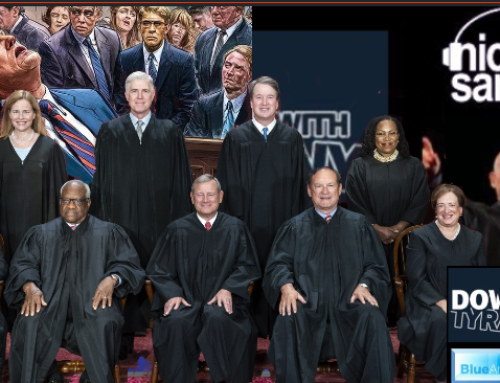
After an extra long Memorial Day weekend due to some health issues, I’m back today.
Sorry for the short show description, but I’m putting out multiple fires today…
Harvey J. Kaye made his every-other-Thursday appearance on the show today to talk about the start of “patriotic season” from Memorial Day to D-Day anniversary to Flag Day to the 4th of July, etc, and how those holidays are used and abused by the right, how FDR redefined our patriotic history, but today’s left has failed to do so.
And in the second hour, I spoke with progressive campaigner and Universal Income advocate Sandhya Anantharaman about the new movement toward Universal Basic Income.
On June 5th, Switzerland will become the first country in the world to vote on universal basic income (UBI).
The vote is occurring as more economists and business leaders are coming out of the woodwork to explain the benefits of UBI for maintaining a broad middle class and combatting poverty — from Nobel Laureate and Princeton Economics Professor Angus Deaton to Facebook Co-Founder Chris Hughes and former ZipCar CEO Robin Chase. From Canada to the UK, countries are testing the idea. Here in the United States, the discussion is just heating up.
This memo lays out what you need to know about the Switzerland referendum.
The basic facts:
- Switzerland will vote on basic income on June 5th.
- The referendum proposes adults receive $2,500 Swiss Francs a month (equivalent to $2,500 in US dollars), and kids $625 francs a month.
- As a binding public referendum, the Swiss are voting on whether they support a universal basic income in the Swiss constitution.
- A “Yes” would not result in immediate implementation, but would be a public mandate to the Government and the Parliament to provide a detailed implementation plan.
More context on the election:
- The UBI referendum is a long shot. When initially presented, UBI polled at only 11% approval, with many people unaware of what it was. Now, it’s polling 40%. This indicates the referendum has been a successful education campaign.
- The Switzerland proposal supplements the social safety net, it does not replace it.
- Total cost is estimated at $208 billion francs per year, and would provide a basic income to all Switzerland’s residents allowing them to survive through job transitions, when caring for a sick relative, and throughout their lives.
The main goal of the Swiss UBI campaign is to use this vote as a tactic to educate the public, who by and large did not previously know much about the issue. While it is not expected to pass, the campaign has greatly increased support for a universal basic income in Switzerland, by nearly 30%, and has sparked conversations across the world.
A recent poll done by DemoScope, in January 2016, showed 59% of people under 35 believe UBI will become reality in Switzerland. Young people overwhelmingly support UBI — making it a political likelihood in many countries in the decades to come.
Swiss campaigners had to gather 100,000 valid signatures from Swiss voters to get on the ballot. Petitioners gathered more than 130,000, which were presented in October of 2013.
The campaign has featured a number of high-profile and creative tactics by advocates:
- Waterfall of coins in front of Parliament: In 2013, the “Swiss initiative for an Unconditional Basic Income” dumped one swiss coin for every inhabitant in the country in front of the Parliament in Bern as they delivered signatures. See the waterfall of gold coins here.
- Robot Parade: On April 30, hundreds of people held a robot parade in Zurich. With automation is growing, the robots called for a guaranteed basic income as the nature of jobs change. See the robot parade here.
- Guinness Book of World Records for largest poster: On May 14th, Swiss campaigners supporting basic income created the largest ever poster, asking: “What would you do if your income were taken care of?” See it here.
History: Discussion around UBI in Switzerland heated up in 1980s, started by academics arguing that it could alleviate poverty. By the 1990s and the 2000s, pro-UBI organizations were formed and started circulating arguments in national press. It has continued to grow in popularity and support as more and more people are introduced to it as an idea.
Implications for the United States: The Swiss campaign for a universal basic income has raised awareness of the issue in the United States, especially among business leaders concerned with maintaining a broad middle class, and shows that referendums are an excellent public education tactic. As people learn about a universal basic income, support grows.
Some of what is happening now in the United States:
- Y Combinator, the world’s most powerful start-up incubator, is planning a study where they provide a group of people with a full basic income for five years. More information here.
- The Universal Income Project is organizing Create-a-thons across the country, where supporters channel their creativity to raise awareness and support for the idea. More information here.
- Robin Chase, former CEO of ZipCar, Chris Hughes, Co-Founder of Facebook, and venture capitalists Albert Wenger and Bill Gross have all come out publicly in support of the idea.
The universal basic income movement in the United States is just beginning, with new organizations forming and discussion growing. The Swiss example shows that the next step will be educating more of the general public on the topic and exploring the possibility of referendums in friendly regional elections.
Tomorrow, Frank Huguenard – the guy who wrote this article that was posted on Huffington Post for about an hour on Saturday before it was mysteriously taken down. We’ll explore it all and then some…







